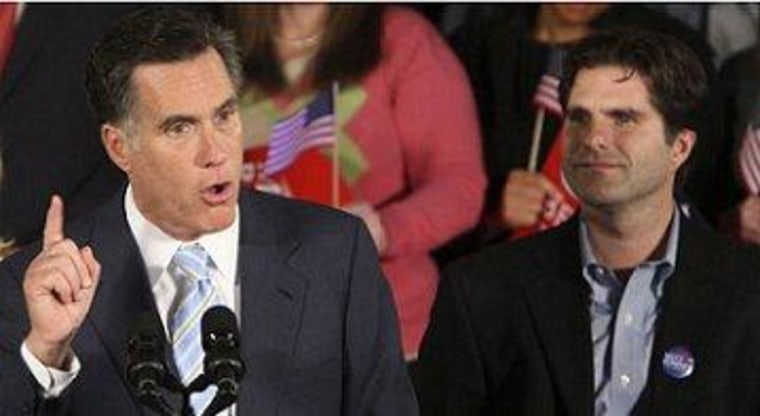Mitt Romney made the case last week that young people looking for opportunities and success should rely on their parents' wealth. If your folks don't have much in the way of disposable income, well, good luck.
To drive home the significance of the Republican candidate's vision, consider the tale of Tagg Romney, the former governor's oldest son.
The New York Times had a fascinating report this week on Tagg getting together in 2008 with Spencer Zwick, a Romney campaign fundraiser, to create a private equity fund called Solamere Capital.
Neither had experience in private equity. But what the close friends did have was the Romney name and a Rolodex of deep-pocketed potential investors who had backed Mr. Romney's presidential run -- more than enough to start them down that familiar path from politics to profit.Two years later, despite a challenging fund-raising climate for private equity, Solamere, named after a wealthy enclave in Utah's Deer Valley where the Romneys have a winter home, finished raising its first fund. The firm blew past its $200 million goal, securing $244 million from 64 investors, including a critical, early $10 million from Mitt Romney and his wife, Ann, and hefty commitments from wealthy supporters of the campaign.
There's no reason to think Solamere Capital did anything wrong. Rather, the point is, Tagg Romney, despite having no background in private equity, partnered with someone else who had no background in private equity, and they were able to put together a very successful financial operation, thanks in large part to Tagg's father's wealth, his last name, and Republican donors who probably assumed Mitt Romney would run for president in 2012.
Adding an interesting wrinkle to the story is the fact that Romney's Solamere Capital invested in Allen Stanford's Stanford Financial Group in 2009, hiring several of the firm's employees. Stanford, of course, is now incarcerated, after getting caught running a $7 billion Ponzi scheme.
Stanford's former employees, who became Tagg Romney's employees, have been accused of ignoring widespread fraud, though Tagg says the staff wasn't with Stanford long enough to learn of the boss' wrongdoing.
Of course, the larger significance is what the story tells us about the Romney vision of economic opportunity.
To hear Tagg tell it, his political connections were irrelevant. "Our relationships with people got us in the door, but that did not get us investors," he told the Times.
Paul Waldman offered a more compelling perspective.
Does Tagg Romney actually believe that his dad had nothing to do with his successful entry into the private equity game, and the millions he has made and will continue to make are the result only of his own merit? That his life is radically different from those of the millions of people struggling to get by only because they don't work as hard as he does, or have his gumption and entrepreneurial spirit? Maybe he does. That may strike you and me as utterly insane, but it wouldn't surprise me a bit. [...]There are a thousand ways in which wealth determines the opportunities available to you, in large part by making things easy. Yes, if you're a poor kid being raised by a single parent who never finished high school, you can get to Harvard. But you're going to have to be one in a million. It's going to take extraordinary spirit, determination, and luck for you to make it. I'm sure Tagg Romney is a fine fellow, but the truth is that even if he was a lazy dolt he'd still do well. He went to the best schools, his parents gave him all kinds of enriching experiences, and he never had to worry about much of anything. He wasn't going to get pulled out of college and have to take a job if one of his parents got sick. When he decided this private equity thing looked interesting, there was an escalator waiting, and all he had to do was hop on. That's opportunity.
Well said.
Look again at what Mitt Romney said last week, while talking to college students, after condemning President Obama for an imaginary "attack" on "success": "Take a shot, go for it, take a risk, get the education, borrow money if you have to from your parents, start a business."
In the Republican's mind, this actually constitutes a vision of opportunity. If you work hard, get into a good school, but can't afford the tuition, Romney believes you'll have the opportunity to find some other college with cheaper tuition. If you're innovating, come up with an idea for a new business, but can't afford the start-up costs, Romney believes you'll have the opportunity to ask your parents for money they may or may not have.
It's not the job of public institutions to create a level playing field; it's the job of individuals to find an unlevel playing field and "take a shot."
It worked out well for Tagg Romney, right?
